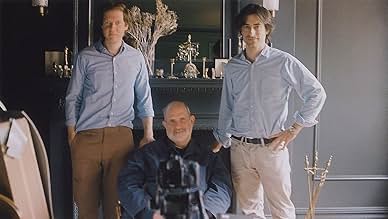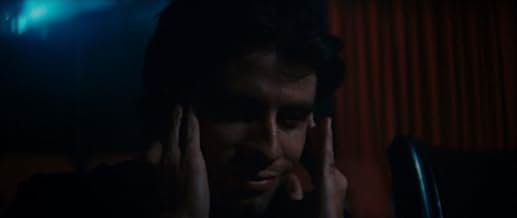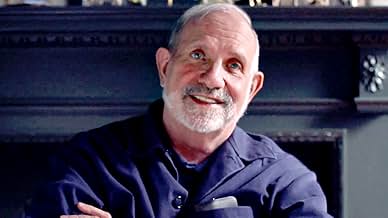IMDb RATING
7.4/10
6.5K
YOUR RATING
A documentary about writer and director Brian De Palma.A documentary about writer and director Brian De Palma.A documentary about writer and director Brian De Palma.
- Awards
- 1 win & 4 nominations total
Mark Hamill
- Self
- (archive footage)
Amy Irving
- Self
- (archive footage)
Kurt Russell
- Self
- (archive footage)
Sissy Spacek
- Self
- (archive footage)
Steven Spielberg
- Self
- (archive footage)
Angela Bettis
- Carietta 'Carrie' White
- (archive footage)
- (uncredited)
Jill Clayburgh
- Self
- (archive footage)
- (uncredited)
Clarence Clemons
- Self
- (archive footage)
- (uncredited)
William Finley
- Winslow
- (archive footage)
- (uncredited)
- …
Vincent Gardenia
- Doctor Byrd
- (archive footage)
- (uncredited)
Don Harvey
- Clark
- (archive footage)
- (uncredited)
Annette Haven
- Self
- (archive footage)
- (uncredited)
Gale Anne Hurd
- Self
- (archive footage)
- (uncredited)
Holly Johnson
- Singing Nightclub Doorman
- (archive footage)
- (uncredited)
Alan King
- Arthur Ruskin
- (archive footage)
- (uncredited)
Featured reviews
Brian De Palma is one of those directors whose films are very polarizing (with a few exceptions, of course). Being that he no longer works within the Hollywood establishment and his output has been drastically reduced, I guess a documentary will have to do. And boy, what a documentary! Still, the word 'documentary' doesn't really describe this film that well, since it's more like a one-on-one conversation. De Palma is very candid about his past and doesn't shy away from emphatically stating his opinions on people he's worked with and his own work. One thing that did surprise me was how little Hitchcock, his clearest influence, was brought up. Not a criticism, just an observation. Clips from VERTIGO, NORTH BY NORTHWEST, and REAR WINDOW are shown, though, in the context of techniques or stylistic features that De Palma learned from them. If anything, the range of artistic influences was much wider than I had ever realized before. Even if he never made another film, De Palma has left behind an incredible body of work that deserves serious study and consideration, and this documentary fills a void for everyone. It provides a nice retrospective for those already familiar and, for those not, a great place to start.
This is a documentary about Brian De Palma's movies and career. It's almost entirely him sitting and talking about his movies. His Hitchcockian influence is obvious to any passing fans. This is a good documentary for anyone who likes his movies. Having come up along with many young directing icons of the era, he has some good insights and stories about everything. It doesn't get too salacious but he's not really sugar-coating too much either. It's a compelling watch and a fine insight into his movies. This is basically a compilation of the best of twenty plus movie commentaries by the director.
Greetings again from the darkness. A self-inflicted career retrospective
that's my most fitting description of this project from co-directors Noah Baumbach and Jake Paltrow. Rather than line-up a slew of third-party observers and collaborators, we get the famed director himself walking us film-by-film through his resume. That's right, Brian De Palma discusses the De Palma film canon
and we movie lovers couldn't ask for anything better.
Beginning with a clip of Vertigo, the doc leads with the Hitchcock influence, almost as a form of disclosure. It's as if everyone associated is saying, Yes we admit it Director De Palma has been heavily influenced and inspired by the works of Alfred Hitchcock. Now pay attention to what he's done with his career – some really good, some not so good, some downright awful. "Underappreciated" might be the best label for De Palma. He was part of the "New Hollywood" with Spielberg, Scorcese, Coppola, and Lucas, yet they are worshiped, while De Palma is mostly ignored.
Mr. De Palma speaks directly to the camera and seems to thoroughly enjoy this opportunity to analyze (and at times defend) his career, providing a self guided reflective approach - a chronological retrospective that doesn't shy away from his inability to put together a streak of successful films. This is direct talk (describing a particular bomb as "one of many disasters") with no apologies from a filmmaker who has worked for five decades. He tells behind the scenes stories in a matter-of-fact manner, not always complimentary of himself, actors or the industry.
The stories and recollections are the highlight here. De Palma speaks highly of Wilford Leach (his mentor and professor at Sarah Lawrence), composer Bernard Hermann and Robert DeNiro, with less than flattering tales of Cliff Robertson (Obsession), Sean Penn (Casualties of War), and Oliver Stone (Scarface). It's fascinating to hear De Palma explain the box office failure of his version of The Bonfire of the Vanities, address the scandal of Body Double, and describe in detail the simultaneous casting (with Spielberg) of Star Wars and Carrie. Even more eye-opening is his reminiscing on the back-and-forth with director Sidney Lumet as they played hot-potato with Scarface and Prince of the City.
Brian De Palma was Columbia University educated (math and physics), and has directed some of the most creative, colorful and controversial films – some of which never received their "due". This may be mostly a film for those who want more inside-industry scoop, but it's a man who takes pride in the fact that famed film critic Pauline Kael was a fan of his work, and that few directors have a more varied canon of film.
His patented "holy mackerel" is on full display as he takes us on the journey of De Palma films, and it's a reminder that "talking head" documentaries can still work provided the talking head doing the talking is saying something worth listening to.
Beginning with a clip of Vertigo, the doc leads with the Hitchcock influence, almost as a form of disclosure. It's as if everyone associated is saying, Yes we admit it Director De Palma has been heavily influenced and inspired by the works of Alfred Hitchcock. Now pay attention to what he's done with his career – some really good, some not so good, some downright awful. "Underappreciated" might be the best label for De Palma. He was part of the "New Hollywood" with Spielberg, Scorcese, Coppola, and Lucas, yet they are worshiped, while De Palma is mostly ignored.
Mr. De Palma speaks directly to the camera and seems to thoroughly enjoy this opportunity to analyze (and at times defend) his career, providing a self guided reflective approach - a chronological retrospective that doesn't shy away from his inability to put together a streak of successful films. This is direct talk (describing a particular bomb as "one of many disasters") with no apologies from a filmmaker who has worked for five decades. He tells behind the scenes stories in a matter-of-fact manner, not always complimentary of himself, actors or the industry.
The stories and recollections are the highlight here. De Palma speaks highly of Wilford Leach (his mentor and professor at Sarah Lawrence), composer Bernard Hermann and Robert DeNiro, with less than flattering tales of Cliff Robertson (Obsession), Sean Penn (Casualties of War), and Oliver Stone (Scarface). It's fascinating to hear De Palma explain the box office failure of his version of The Bonfire of the Vanities, address the scandal of Body Double, and describe in detail the simultaneous casting (with Spielberg) of Star Wars and Carrie. Even more eye-opening is his reminiscing on the back-and-forth with director Sidney Lumet as they played hot-potato with Scarface and Prince of the City.
Brian De Palma was Columbia University educated (math and physics), and has directed some of the most creative, colorful and controversial films – some of which never received their "due". This may be mostly a film for those who want more inside-industry scoop, but it's a man who takes pride in the fact that famed film critic Pauline Kael was a fan of his work, and that few directors have a more varied canon of film.
His patented "holy mackerel" is on full display as he takes us on the journey of De Palma films, and it's a reminder that "talking head" documentaries can still work provided the talking head doing the talking is saying something worth listening to.
Yes, he made some good movies, but he made some very average and awful movies. Most of the time I felt I was watching movies that were too clinical, no emotions to them. Which is odd, considering the subject matter and violence to them. DePalma seemed to be more interested in creating something that was a lesson in cinematography, rather than tapping into your connection to the story or the characters. This documentary shows that. I felt he was giving a class in movie making, which most of his movies seem to be like. I never had the emotional pull like I have with The Godfather, American Graffiti, Saving Private Ryan, Taxi Driver, or Bonnie and Clyde. I cared about the characters; I cared about the stories; when I got to the end of the movie, I didn't want it to end. ThT is missing in 90% of DePalma movies. He fails to make the emotional connection with his audience and he doesn't seem to realize that audiences what an emotional connection.
For those with in interest in De Palma's films and long career, or just cinema in general, this is a highly entertaining and informative visit with one of the most interesting, controversial and eclectic American film makers of the last 50 years.
The form couldn't be simpler. Just Brian De Palma sitting in a chair telling stories about each of his films in chronological order, from his first shorts in the mid 1960s to "Passion" in 2013 – an amazing span of almost 50 years. His comments are interspersed with well chosen clips from his own work, and – when he makes a reference – those of other film-makers as well.
What makes this form work so well is that De Palma is a terrific interview subject. He's funny, thoughtful, insightful, and sometimes very entertainingly snarky. He is also tremendously honest. He saves many of his toughest criticisms for himself, analyzing with surgical precision why certain of his films could have been better, and his part in those lapses. Very few directors are willing to talk at length about choices and moments they regret, usually choosing only to blame others for artistic goals falling short. But by acknowledging his own choices that didn't work out he makes himself very human, empathetic and trustworthy as a subject. He's not interested in self-glorification as much as he is in sharing a lifetime of wisdom won by mostly hard experience (few of De Palma's films got the support and attention they deserved at the time of their release – some, like 'Scarface' only became iconic years later). And he also talks with a touching wistfulness about those films he is truly proud of that never got the support – critical, commercial or both – that they deserved.
Overall you end up with a real sense of what it's like to be tremendously talented, protean, rule-breaking film-maker over 50 years – the ridiculous highs and lows, the multiple struggles, hard times and occasional triumphs of a high-profile artistic life in the weirdness that is the American film scene.
The form couldn't be simpler. Just Brian De Palma sitting in a chair telling stories about each of his films in chronological order, from his first shorts in the mid 1960s to "Passion" in 2013 – an amazing span of almost 50 years. His comments are interspersed with well chosen clips from his own work, and – when he makes a reference – those of other film-makers as well.
What makes this form work so well is that De Palma is a terrific interview subject. He's funny, thoughtful, insightful, and sometimes very entertainingly snarky. He is also tremendously honest. He saves many of his toughest criticisms for himself, analyzing with surgical precision why certain of his films could have been better, and his part in those lapses. Very few directors are willing to talk at length about choices and moments they regret, usually choosing only to blame others for artistic goals falling short. But by acknowledging his own choices that didn't work out he makes himself very human, empathetic and trustworthy as a subject. He's not interested in self-glorification as much as he is in sharing a lifetime of wisdom won by mostly hard experience (few of De Palma's films got the support and attention they deserved at the time of their release – some, like 'Scarface' only became iconic years later). And he also talks with a touching wistfulness about those films he is truly proud of that never got the support – critical, commercial or both – that they deserved.
Overall you end up with a real sense of what it's like to be tremendously talented, protean, rule-breaking film-maker over 50 years – the ridiculous highs and lows, the multiple struggles, hard times and occasional triumphs of a high-profile artistic life in the weirdness that is the American film scene.
Did you know
- TriviaPaltrow and Baumbach filmed Brian De Palma for one week in 2010, collecting about 30 hours worth of interview footage. De Palma, sitting in Paltrow's living room and talking about his career, wore the same shirt every day for continuity's sake. But the movie ended up premiering in 2015 and the director made another movie years after the interview, which explains why when he talks about Passion the viewer only hears his voice but doesn't see him talking.
- GoofsFemme Fatale (2002)'s release date is incorrectly listed as 2000, both in the body of the film and in the end credits.
- Quotes
[repeated line]
Brian De Palma: Holy mackerel.
- ConnectionsFeatures The Phantom of the Opera (1925)
- SoundtracksDe Palma (Main Title Theme)
Written by Nathan Johnson
Courtesy of Choplogic Music
Under license from Nathan Johnson
- How long is De Palma?Powered by Alexa
Details
Box office
- Gross US & Canada
- $165,237
- Opening weekend US & Canada
- $30,355
- Jun 12, 2016
- Gross worldwide
- $168,045
- Runtime
- 1h 50m(110 min)
- Color
- Aspect ratio
- 1.85 : 1
Contribute to this page
Suggest an edit or add missing content














































